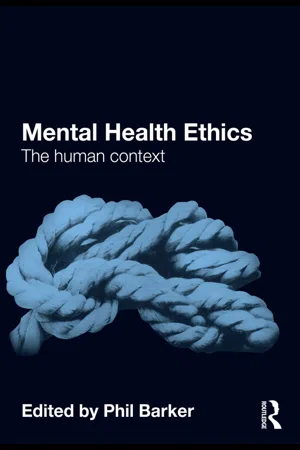
- 378 pages
- English
- ePUB (mobile friendly)
- Available on iOS & Android
About this book
All human behaviour is, ultimately, a moral undertaking, in which each situation must be considered on its own merits. As a result ethical conduct is complex. Despite the proliferation of Codes of Conduct and other forms of professional guidance, there are no easy answers to most human problems. Mental Health Ethics encourages readers to heighten their awareness of the key ethical dilemmas found in mainstream contemporary mental health practice.
This text provides an overview of traditional and contemporary ethical perspectives and critically examines a range of ethical and moral challenges present in contemporary 'psychiatric-mental' health services. Offering a comprehensive and interdisciplinary perspective, it includes six parts, each with their own introduction, summary and set of ethical challenges, covering:
- fundamental ethical principles;
- legal issues;
- specific challenges for different professional groups;
- working with different service user groups;
- models of care and treatment;
- recovery and human rights perspectives.
Providing detailed consideration of issues and dilemmas, Mental Health Ethics helps all mental health professionals keep people at the centre of the services they offer.
Frequently asked questions
- Essential is ideal for learners and professionals who enjoy exploring a wide range of subjects. Access the Essential Library with 800,000+ trusted titles and best-sellers across business, personal growth, and the humanities. Includes unlimited reading time and Standard Read Aloud voice.
- Complete: Perfect for advanced learners and researchers needing full, unrestricted access. Unlock 1.4M+ books across hundreds of subjects, including academic and specialized titles. The Complete Plan also includes advanced features like Premium Read Aloud and Research Assistant.
Please note we cannot support devices running on iOS 13 and Android 7 or earlier. Learn more about using the app.
Information
Section 1
Ethics and mental health
Section preface
1
Ethics
Everyday ethics
Damned to anguish
Table of contents
- Contents
- Contributors
- Preface
- Acknowledgements
- Editor’s note
- Section 1 Ethics and mental health
- Section 2 The professional context
- Section 3 Care and treatment
- Section 4 The human context
- Section 5 The legal context
- Section 6 The ideological context
- Index